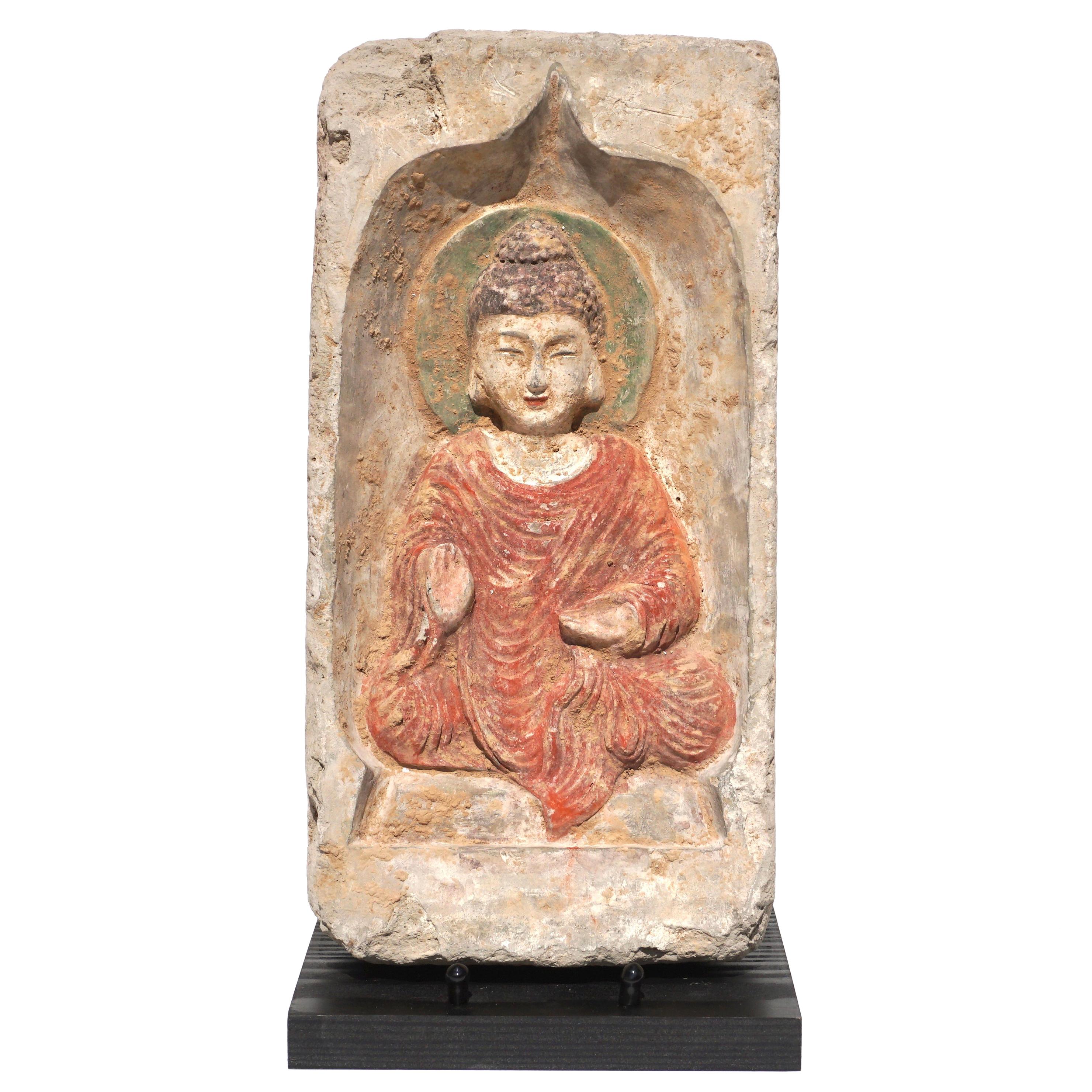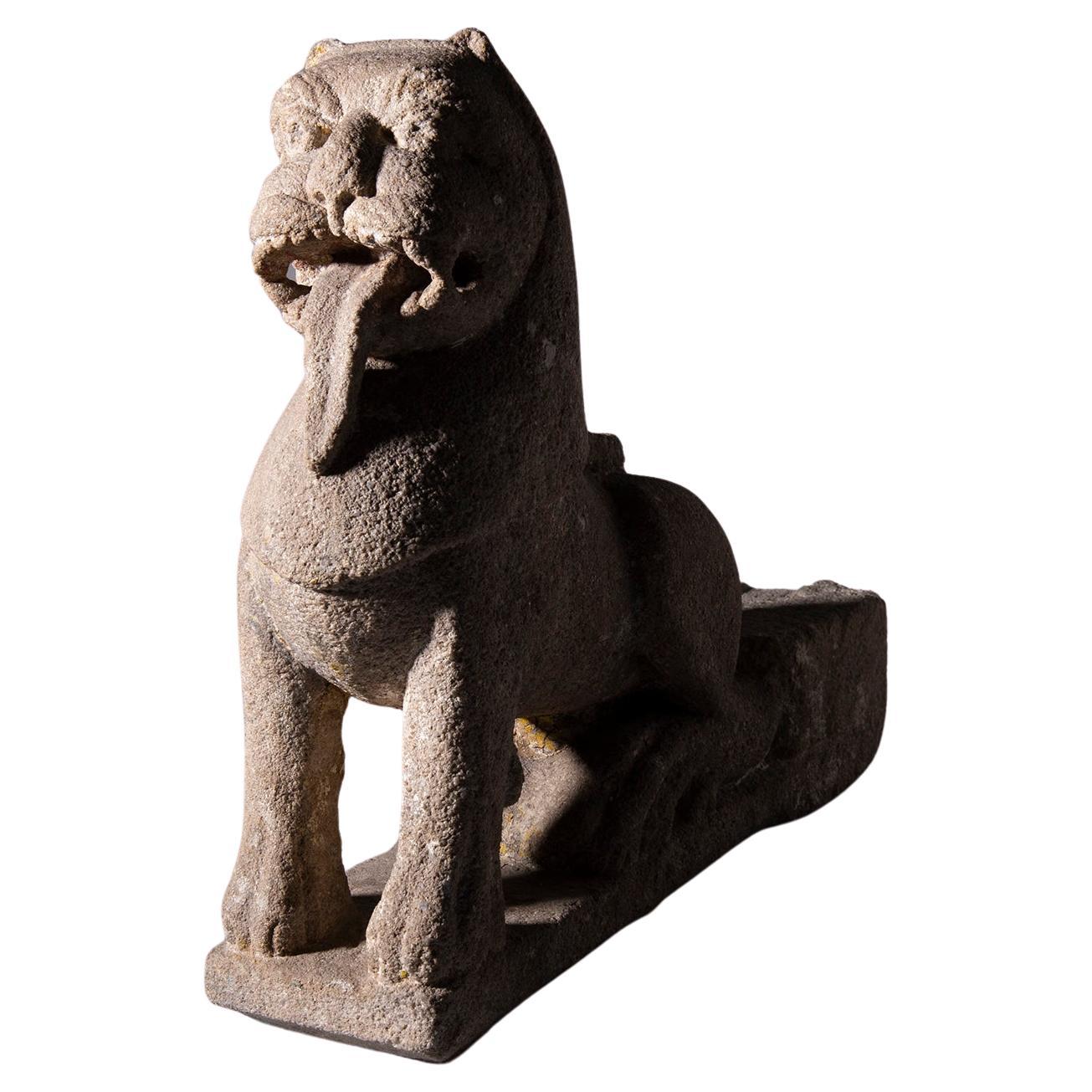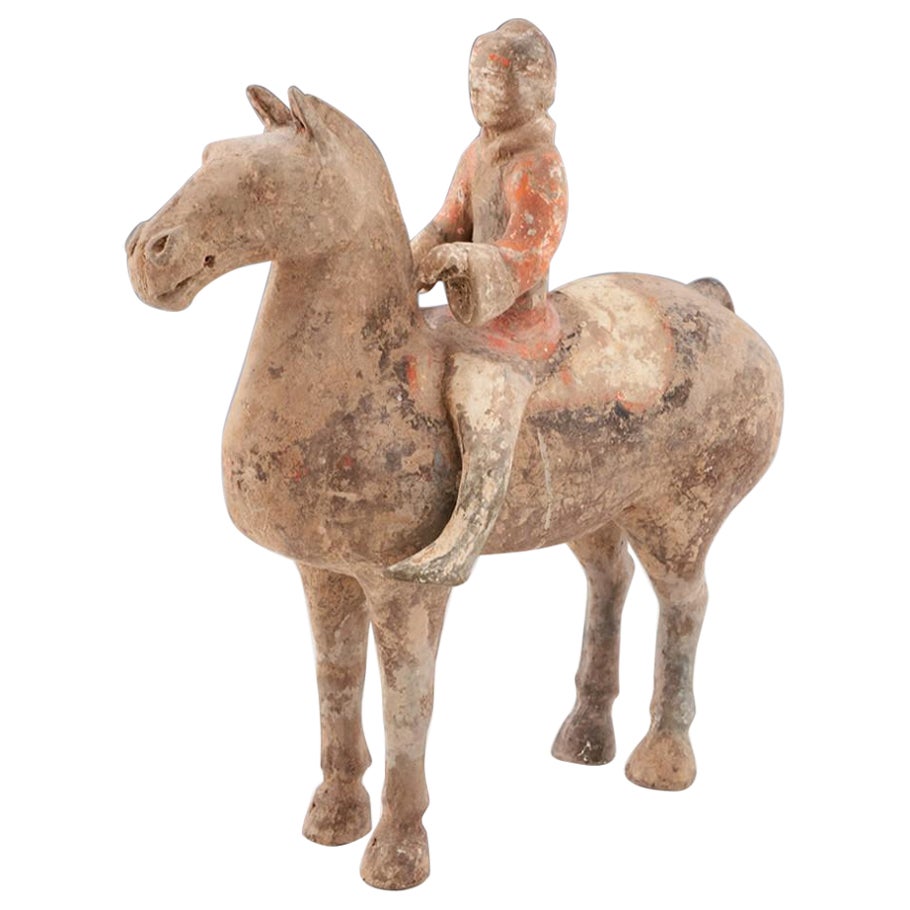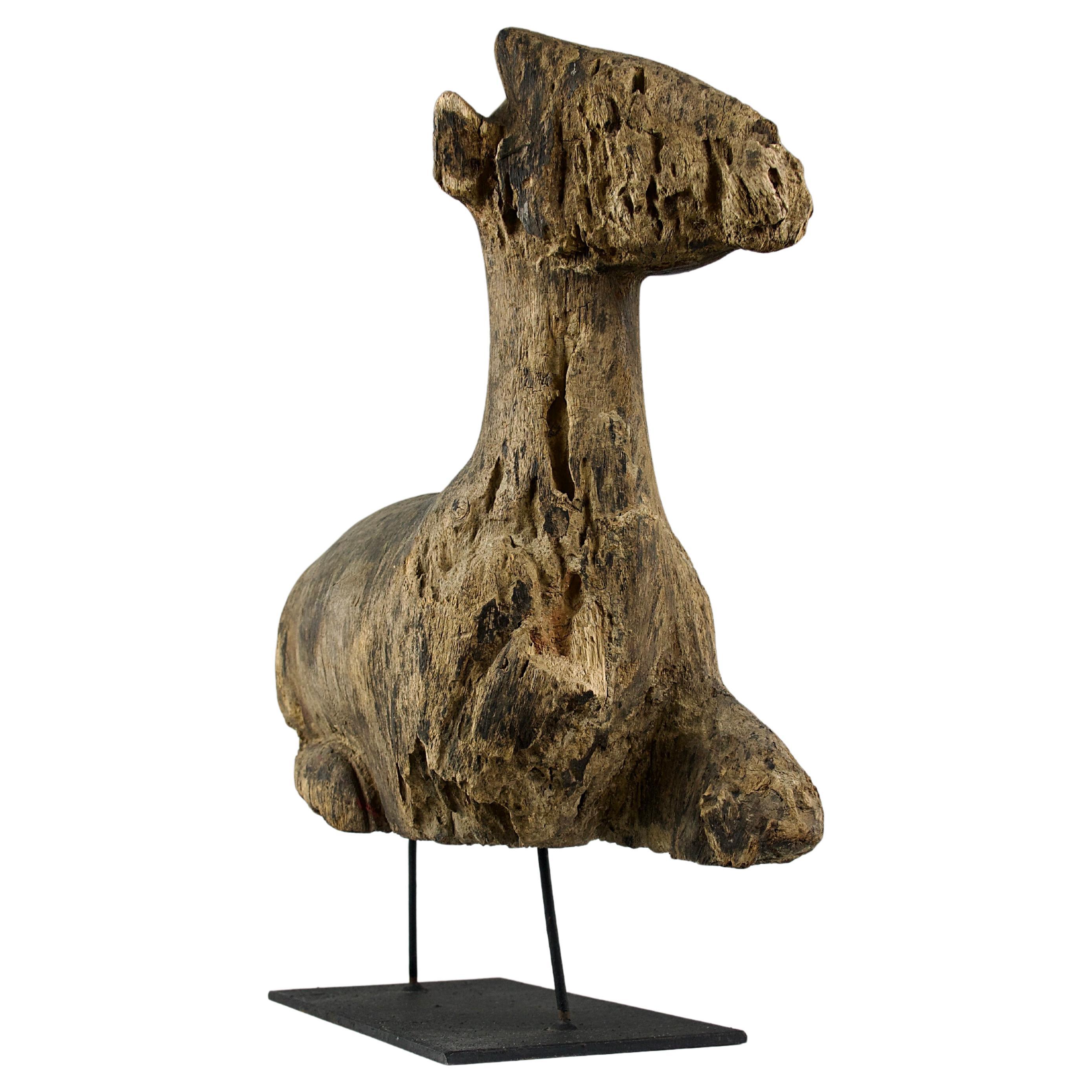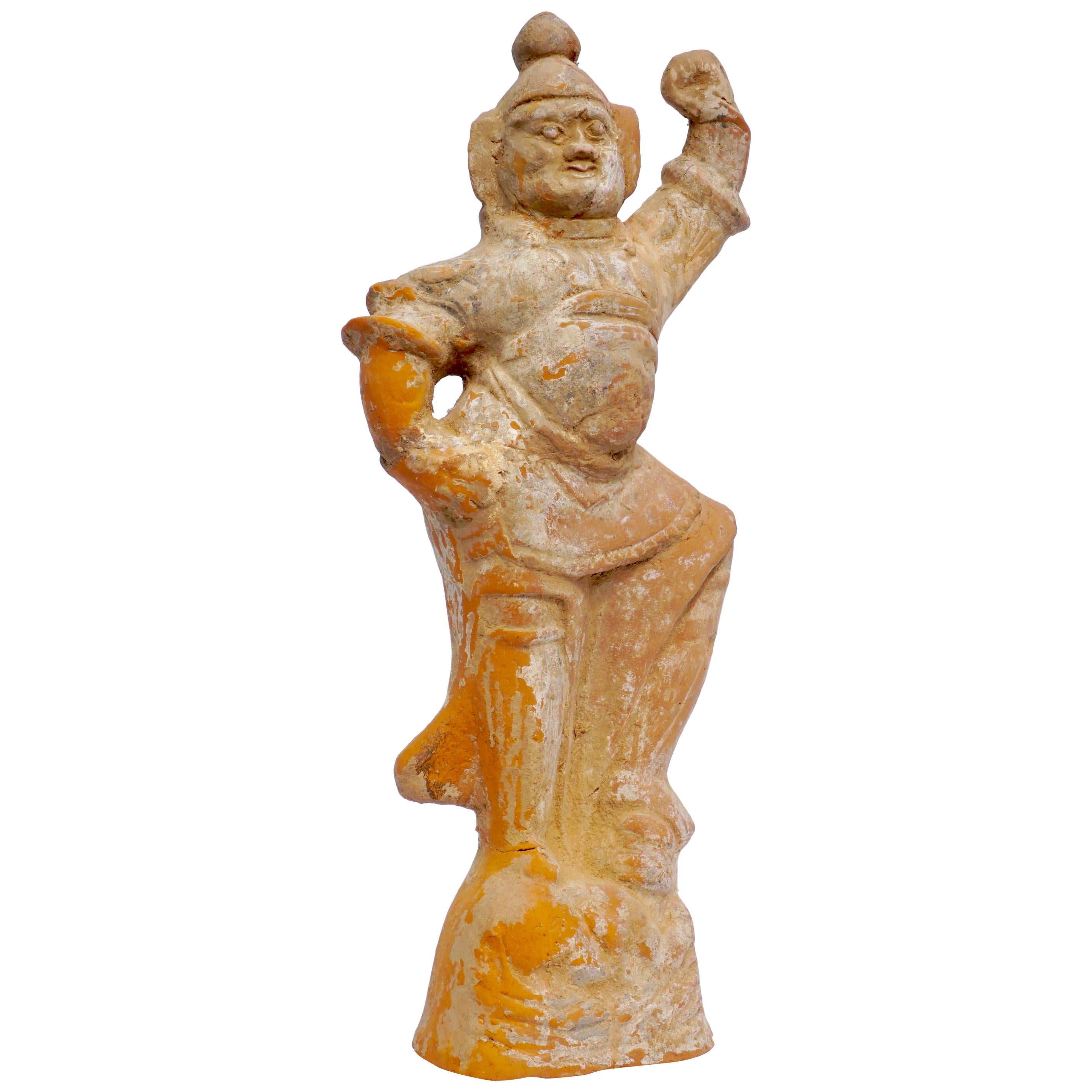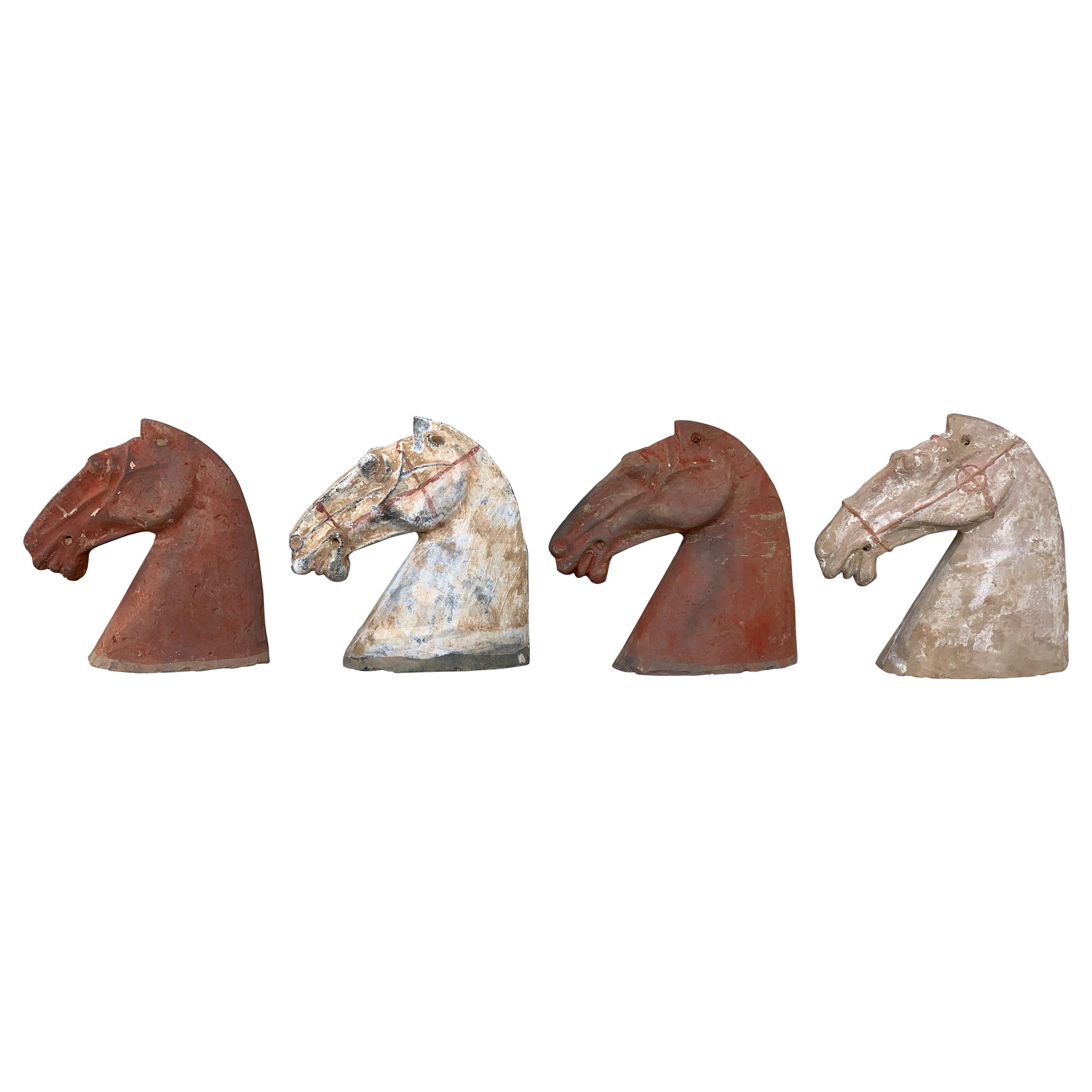Items Similar to Northern Wei Dynasty Terracotta Sculpture of Buddha 386-534 AD
Want more images or videos?
Request additional images or videos from the seller
1 of 7
Northern Wei Dynasty Terracotta Sculpture of Buddha 386-534 AD
About the Item
C. 386-534 AD. Chinese Northern Wei Dynasty.
A interim Han-Tang Dynasty terracotta brick in a cream-coloured fabric featuring a beautiful depiction of a seated Buddha with a red robe, black hair and blue halo. The figure has a raised right hand, with the palm facing outwards and the fingers upwards while the left arm is held close to the body. This gesture, known as the Abhaya Mudra symbolises wisdom and fearlessness.
The Northern Wei dynasty ruled northern China from c. 386 to 534 AD and its most famous achievement was unifying a large Empire following a long period of social and political turbulence. However, craftsmen working under this dynasty were also responsible for beautiful works of art, many of which relate to the Buddhist religion, as this object exemplifies.
Provenance: Property of a North London gentleman; previously acquire on the UK/European art market in the 1990s.
A Certificate of Authenticity accompanies this item with a wooden stand.
Dimensions: 6.8 inches x 13.25 inches x 2.37 inches: L:340mm / W:170mm; 5.45kg
Condition: Very Good condition with wear commensurate of age and use.
AVANTIQUES is dedicated to providing an exclusive curated collection of Fine Arts, Paintings, Bronzes, Asian treasures, Art Glass and Antiques. Our inventory represents time-tested investment quality items with everlasting decorative beauty. We look forward to your business and appreciate any reasonable offers. All of our curated items are vetted and guaranteed authentic and as described. Avantiques only deals in original antiques and never reproductions. We stand behind our treasures with a full money back return if the items are not as described.
Please also consider Avantique’s antique and ancient Asian Art Collection of Han Dynasty, Tang Dynasty, Ming Dynasty, Qing, and Republic period items to complete your home and office decorations with class. Avantiques has Asian pottery, terra cotta, bronze, and paintings to complement your collection. We strive to collect the highest quality Asian antiquities in exceptional condition.
- Dimensions:Height: 6.9 in (17.53 cm)Width: 13.35 in (33.91 cm)Depth: 2.25 in (5.72 cm)
- Style:Han (Of the Period)
- Materials and Techniques:Terracotta,Cast
- Place of Origin:
- Period:
- Date of Manufacture:400
- Condition:Wear consistent with age and use.
- Seller Location:Dallas, TX
- Reference Number:1stDibs: LU1774224223272
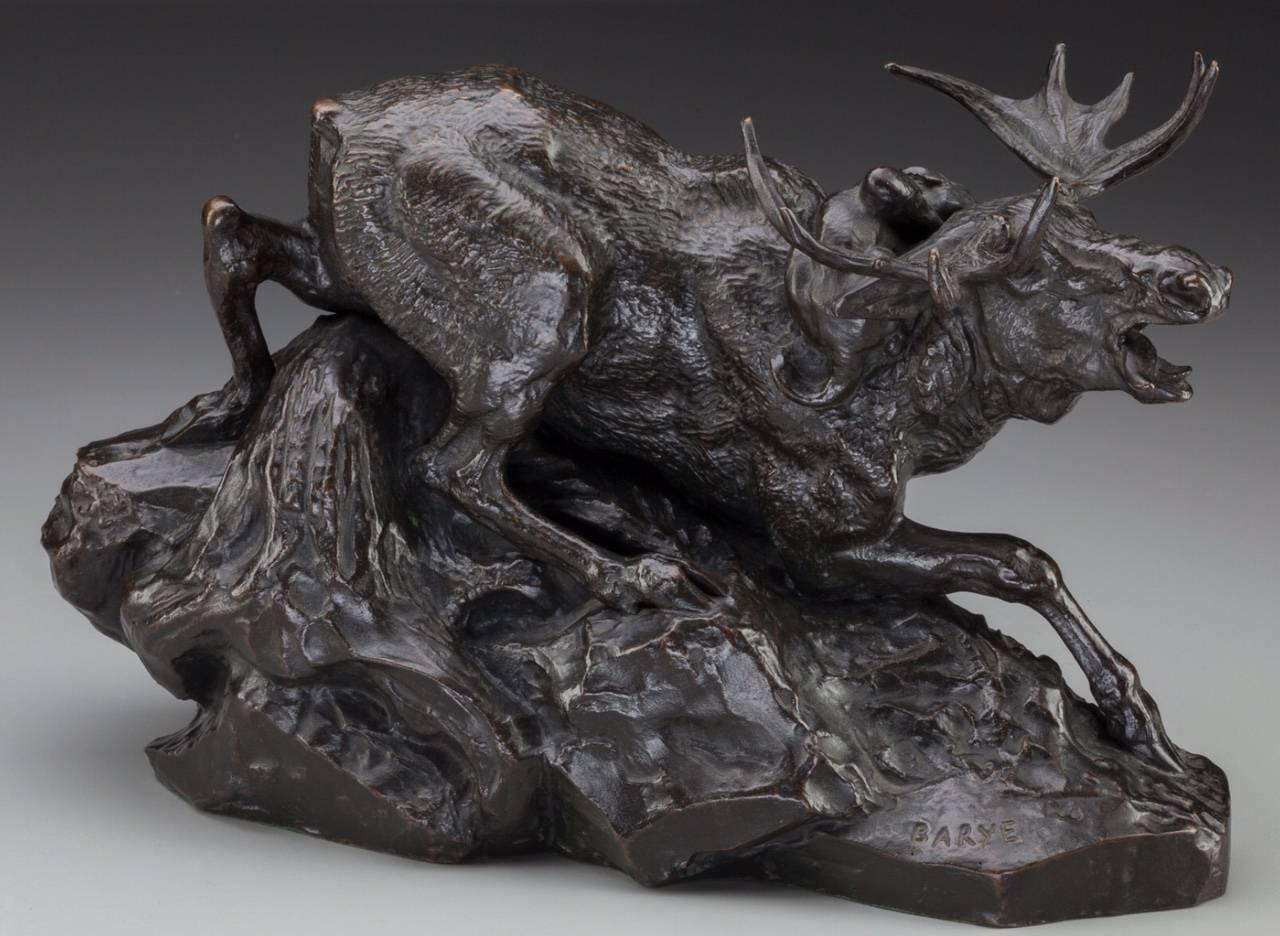
About the Seller
4.9
Gold Seller
These expertly vetted sellers are highly rated and consistently exceed customer expectations.
Established in 2000
1stDibs seller since 2015
403 sales on 1stDibs
Typical response time: 1 hour
- ShippingRetrieving quote...Ships From: Dallas, TX
- Return PolicyA return for this item may be initiated within 7 days of delivery.
More From This SellerView All
- Northern Wei Dynasty Terracotta Sculpture Of A Seated Buddha 386-534 ADLocated in Dallas, TXC. 386-534 AD. Chinese Northern Wei Dynasty. A pre Tang Dynasty terracotta brick in a cream-coloured fabric featuring a beautiful depiction of a...Category
Antique 15th Century and Earlier Chinese Han Figurative Sculptures
MaterialsTerracotta
- Tang Dynasty Painted Terracotta Sculpture of a LokapalaBy Tang DynastyLocated in Dallas, TXTang Dynasty terracotta Pottery Tomb figure of the Lokapala Warrier Deity. Figure molded wearing heavy armor, standing in a dynamic pose with left arm raised in a threatening gesture...Category
Antique 15th Century and Earlier Chinese Tang Figurative Sculptures
MaterialsTerracotta
- Pair of Han Dynasty Horse Heads (206BC - 220AD) AttributedLocated in Dallas, TXPair of Chinese Han dynasty horse heads Han dynasty (206 BC-220 AD) earthenware gray pottery Each approx.: 6.25 inches high. 6.5 inches wide. 2...Category
Antique 15th Century and Earlier Chinese Han Animal Sculptures
MaterialsPottery
- Chinese Northern Wei Terrecotta Attendant - TL TestedLocated in Dallas, TXCirca 386-534 ADA well defined Chinese Northern Wei Terracotta Attendant Statue. The Figure is depicted standing with his hands along the body, wearin...Category
Antique 15th Century and Earlier Chinese Tang Figurative Sculptures
MaterialsTerracotta
- Large Han Dynasty Pottery Sculpture of a DogLocated in Dallas, TXHan Dynasty life size Terracotta sculpture of a dog. Buried in a tomb for thousands of years; this mingqi companion has decided to come back and accompany the living. I’m actually taking a liking to this pup; most probably a fierce pit bull...Category
Antique 15th Century and Earlier Chinese Han Animal Sculptures
MaterialsTerracotta
- Han Dynasty Pottery Sculpture of a Winged Lion Mythical BeastLocated in Dallas, TXA Large Han Dynasty Terracotta sculpture of a Mythical Beast. Possibly a horned tiger but most probably a winged lion often seen in ancient jade sculptures. I cant emphasize how ra...Category
Antique 15th Century and Earlier Chinese Han Animal Sculptures
MaterialsPottery
You May Also Like
- Chinese lion sculpture , WEI DYNASTY PROBABLYLocated in Milano, ITIn the heart of an ancient empire, stands a sculpture of breathtaking power and majesty, probable Wei dynasty. A mighty beast, sculpted from the very essence of strength, is poised i...Category
Antique 15th Century and Earlier Chinese Qing Animal Sculptures
MaterialsStone
- Han Dynasty Horse Sculpture, 206BC- 209 ADLocated in Tunbridge Wells, GBHan Dynasty Horse Sculpture, 206BC- 209 AD It is interetsing to note the position of the riders feet. They are gripping the shoulder of the horse. D...Category
Antique 15th Century and Earlier Chinese Han Animal Sculptures
MaterialsPottery
- Han Dynasty, Laying Doe Wood Sculpture, China 100ADLocated in PARIS, FRSuperb sculpture of a laying doe from the Chinese Han Dynasty (206BC-220AD). Remainders of polychromic paint, namely red, symbol of good fortune and joy as well as the season of summer, and green, symbol of vigor and vitality and the season of spring. Mounted on base. A similar sculpture in bronze is kept at the Met Museum with the following description " A low bed, small table, and screen were often the only furnishings in a Han-dynasty room. The floors were generally covered with mats kept in place with weights in the shape of single animals, fighting beasts, or entertainers." Condition seen in pictures. Dimensions in cm ( H x L x l ) : - Sculpture : 35 x 40 x 10 - With base : 45.5 x 44 x 15 The Han Dynasty ruled China from 206 B.C. to 220 A.D. and was the second imperial dynasty of China. It is known for its promotion of Confucianism as the state religion and opening the Silk Road trade route to Europe, permanently altering the course of Chinese history. Han Dynasty art and inventions like paper still influence the world today. From the Han Dynasty to the present, deer can be found in many materials and media—rock crystal, nephrite, ink on paper, porcelain, cloisonné enamel, jade, bamboo root, textile, bronze, etc.—alone or in groups, among trees and rocks and in various positions. They appear on everyday objects, from boxes to incense burners, incense holders, lamps, mirror holders and the droppers scholars used when they wrote. A symbol of longevity and grace in Chinese mythology, the word deer is pronounced lu, a homonym for emoluments—favors granted to officials. They therefore represent wealth, nobility and success in imperial examinations (civil service exams for selecting candidates for the state bureaucracy in Imperial China). Deer were the faithful companions of Shu Lao, the god of longevity, and the goddess Magu. They were reputed to live long and to be the only creature able to find the mushroom of immortality, linghzhi. Although its spots are different, deer are sometimes confused or associated with stags, a Manchu hunting trophy whose antlers served to make prestigious furniture. (La Gazette Drouot, Claire Papon) For the colours found on this piece, in Chinese culture, red symbolizes good fortune and joy. Green, symbolizes the spring when everything is brimming over with vigor and vitality. The Han Dynasty (206 B.C. to 220 A.D.) continued the Qin Dynasty’s use of dark colours, but incorporated red. During the earlier years, or Western Han Dynasty, ordinary people wore red while court dress was black. Shoes were red in color. The clothing worn for sacrificial rites was black edged with red. In the later Eastern Han Dynasty, red symbolized the dynasty’s “fire Virtue” and became predominant. Court dress was red. Sacrificial rites called for a red-edged white layer under robes with red socks...Category
Antique 15th Century and Earlier Chinese Han Mounted Objects
MaterialsWood
- Pair of Red Sculpture Han Dynasty Gray Pottery Horse Heads '206BC-220AD'Located in Miami, FLPair of Chinese Han dynasty horse heads Han dynasty Style (206 BC-220 AD) earthenware gray pottery Each approximate measures: 6 inches high. 6...Category
Mid-20th Century Chinese Han Sculptures and Carvings
MaterialsTerracotta
- Han Dynasty Horse Sculpture, 206 BC- 209 ADLocated in Tunbridge Wells, GBHan Dynasty Horse Sculpture, 206 BC- 209 AD It is interetsing to note the position of the riders feet. They are gripping the shoulder of the horse. ...Category
Antique 15th Century and Earlier Chinese Animal Sculptures
MaterialsPottery
- Chinese Terracotta Tomb Figure East Han DynastyLocated in Atlanta, GAA small Chinese terracotta tomb figure (Ni Yong) from East Han dynasty (25-220 AD), likely from the area of nowadays Sichuan. It depicts a sitting male wit...Category
Antique 15th Century and Earlier Chinese Han Ceramics
MaterialsTerracotta
Recently Viewed
View AllMore Ways To Browse
Ancient Terracotta
Red Robe
Decorative Bricks
Large Buddha Hand
Large Terracotta Pottery
Terracotta Dynasty
Money China
Chinese Antiques London
C Terras
Antique Terracotta Sculptures
Buddha Stand
Bronze Buddha Hands
Ming Dynasty Large
Ming Dynasty Sculpture
The Figure Of Buddha
Buddhist Sculpture Antique
Ad Pottery
Early European Figurative Sculpture
